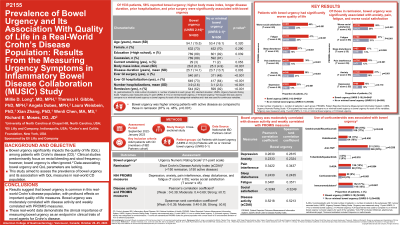Monday Poster Session
Category: IBD
P2155 - Prevalence of Bowel Urgency and Its Association with Quality of Life in a Real-World Crohn’s Disease Population: Results from the Measuring Urgency Symptoms in Inflammatory Bowel Disease Collaboration (MUSIC) Study
Monday, October 23, 2023
10:30 AM - 4:15 PM PT
Location: Exhibit Hall

Has Audio

Millie Long, MD, MPH
UNC Chapel Hill
Chapel Hill, NC
Presenting Author(s)
Millie D. Long, MD, MPH1, Theresa Hunter Gibble, PhD, MPH2, Angela Dobes, MPH3, Laura Weisbein, PhD4, Xian Zhang, PhD4, Wenli Chen, MA, MS4, Richard E. Moses, DO, JD2
1UNC Chapel Hill, Chapel Hill, NC; 2Eli Lilly and Company, Indianapolis, IN; 3Crohn’s and Colitis Foundation, New York, NY; 4University of North Carolina at Chapel Hill, Chapel Hill, NC
Introduction: In patients with Crohn’s disease (CD), clinical trials often focus on disease activity measures such as abdominal pain and stool frequency. Patients with CD frequently experience bowel urgency (BU), yet less is known about the prevalence of BU and its association with quality of life (QoL) in real-world CD populations.
Methods: In this cross-sectional study from the nationwide inflammatory bowel disease (IBD) Partners cohort, BU was measured utilizing the validated 11-point Urgency Numeric Rating Scale (NRS)1. This was categorized into “no or minimal” BU (Urgency NRS=0-1) vs. BU (Urgency NRS=2-10). Remission was measured utilizing the Short CD Activity Index (sCDAI). QoL measures included Patient Reported Outcome Measurement Information System (PROMIS) measures of depression, anxiety, pain interference, sleep disturbance, fatigue, and social satisfaction via T-scores. Bivariate analyses were utilized to compare categorical variables by urgency. Correlations were performed utilizing Pearson and Spearman rank as appropriate.
Results: Among 1533 patients with CD, 58% reported BU. Rates of BU were higher among patients with active disease as compared to those with remission (87% vs. 48%, p< 0.001). Other factors significantly associated with BU included higher body mass index (BMI), longer disease duration, prior hospitalization, prior surgery, and corticosteroid use (p< 0.05 for all) (Table). Patients with BU had significantly higher rates of depression (25% vs. 13%, p< 0.001), anxiety (39% vs. 21%, p< 0.001), pain (38% vs. 14%, p< 0.001), sleep disturbance (27% vs. 14%, p< 0.001), fatigue (47% vs. 24%, p< 0.001) and worse social satisfaction (46% vs. 23%, p< 0.001; Figure). In a sub-analysis of those in remission, BU continued to be significantly associated with anxiety, pain, fatigue, and worse social satisfaction (p≤0.001 for all). BU was moderately correlated with disease activity (r=0.52) and weakly correlated with PROMIS measures (r=0.23-0.34).
Discussion: Bowel urgency is common in this real-world Crohn’s disease population, with profound effects on important quality of life measures. Factors associated with more severe disease, such as prior surgery, hospitalization and longer disease duration are also associated with bowel urgency in Crohn’s disease. Bowel urgency is moderately associated with disease activity.
Reference: 1Dubinsky MC, et al. J Patient Rep Outcomes.6, 114 (2022).

Disclosures:
Millie D. Long, MD, MPH1, Theresa Hunter Gibble, PhD, MPH2, Angela Dobes, MPH3, Laura Weisbein, PhD4, Xian Zhang, PhD4, Wenli Chen, MA, MS4, Richard E. Moses, DO, JD2. P2155 - Prevalence of Bowel Urgency and Its Association with Quality of Life in a Real-World Crohn’s Disease Population: Results from the Measuring Urgency Symptoms in Inflammatory Bowel Disease Collaboration (MUSIC) Study, ACG 2023 Annual Scientific Meeting Abstracts. Vancouver, BC, Canada: American College of Gastroenterology.
1UNC Chapel Hill, Chapel Hill, NC; 2Eli Lilly and Company, Indianapolis, IN; 3Crohn’s and Colitis Foundation, New York, NY; 4University of North Carolina at Chapel Hill, Chapel Hill, NC
Introduction: In patients with Crohn’s disease (CD), clinical trials often focus on disease activity measures such as abdominal pain and stool frequency. Patients with CD frequently experience bowel urgency (BU), yet less is known about the prevalence of BU and its association with quality of life (QoL) in real-world CD populations.
Methods: In this cross-sectional study from the nationwide inflammatory bowel disease (IBD) Partners cohort, BU was measured utilizing the validated 11-point Urgency Numeric Rating Scale (NRS)1. This was categorized into “no or minimal” BU (Urgency NRS=0-1) vs. BU (Urgency NRS=2-10). Remission was measured utilizing the Short CD Activity Index (sCDAI). QoL measures included Patient Reported Outcome Measurement Information System (PROMIS) measures of depression, anxiety, pain interference, sleep disturbance, fatigue, and social satisfaction via T-scores. Bivariate analyses were utilized to compare categorical variables by urgency. Correlations were performed utilizing Pearson and Spearman rank as appropriate.
Results: Among 1533 patients with CD, 58% reported BU. Rates of BU were higher among patients with active disease as compared to those with remission (87% vs. 48%, p< 0.001). Other factors significantly associated with BU included higher body mass index (BMI), longer disease duration, prior hospitalization, prior surgery, and corticosteroid use (p< 0.05 for all) (Table). Patients with BU had significantly higher rates of depression (25% vs. 13%, p< 0.001), anxiety (39% vs. 21%, p< 0.001), pain (38% vs. 14%, p< 0.001), sleep disturbance (27% vs. 14%, p< 0.001), fatigue (47% vs. 24%, p< 0.001) and worse social satisfaction (46% vs. 23%, p< 0.001; Figure). In a sub-analysis of those in remission, BU continued to be significantly associated with anxiety, pain, fatigue, and worse social satisfaction (p≤0.001 for all). BU was moderately correlated with disease activity (r=0.52) and weakly correlated with PROMIS measures (r=0.23-0.34).
Discussion: Bowel urgency is common in this real-world Crohn’s disease population, with profound effects on important quality of life measures. Factors associated with more severe disease, such as prior surgery, hospitalization and longer disease duration are also associated with bowel urgency in Crohn’s disease. Bowel urgency is moderately associated with disease activity.
Reference: 1Dubinsky MC, et al. J Patient Rep Outcomes.6, 114 (2022).

Figure: Figure: Associations between bowel urgency and PROMIS measures in the CD population.
N, Total number of patients; n, number of patients in the subgroups; PROMIS, Patient-Reported Outcome Measurement Information System; CD, Crohn’s Disease.
PROS measured by PROMIS T-scores, dichotomized at ≥55 or ≤45 for each measure as appropriate.
Bowel urgency was measured via 11 point validated scale, 0-1=No or minimal bowel urgency, 2-10= bowel urgency.
p-value was measured by chi-square test.
N, Total number of patients; n, number of patients in the subgroups; PROMIS, Patient-Reported Outcome Measurement Information System; CD, Crohn’s Disease.
PROS measured by PROMIS T-scores, dichotomized at ≥55 or ≤45 for each measure as appropriate.
Bowel urgency was measured via 11 point validated scale, 0-1=No or minimal bowel urgency, 2-10= bowel urgency.
p-value was measured by chi-square test.
Disclosures:
Millie D. Long: AbbVie – Consultant. Bristol Myers Squibb – Consultant. Eli Lilly – Consultant, Grant/Research Support. Genentech – Consultant. Intercept – Consultant. Janssen – Consultant. Pfizer – Consultant, Grant/Research Support. Prometheus – Consultant. Roche – Consultant. Salix – Consultant. Takeda – Consultant, Grant/Research Support. Target PharmaSolutions – Consultant. UCB – Consultant. Valeant – Consultant.
Theresa Hunter Gibble: Eli Lilly and Company – Employee, stockholder.
Angela Dobes indicated no relevant financial relationships.
Laura Weisbein indicated no relevant financial relationships.
Xian Zhang indicated no relevant financial relationships.
Wenli Chen indicated no relevant financial relationships.
Richard E. Moses: Eli Lilly and Company – Employee, Stock-privately held company.
Millie D. Long, MD, MPH1, Theresa Hunter Gibble, PhD, MPH2, Angela Dobes, MPH3, Laura Weisbein, PhD4, Xian Zhang, PhD4, Wenli Chen, MA, MS4, Richard E. Moses, DO, JD2. P2155 - Prevalence of Bowel Urgency and Its Association with Quality of Life in a Real-World Crohn’s Disease Population: Results from the Measuring Urgency Symptoms in Inflammatory Bowel Disease Collaboration (MUSIC) Study, ACG 2023 Annual Scientific Meeting Abstracts. Vancouver, BC, Canada: American College of Gastroenterology.
